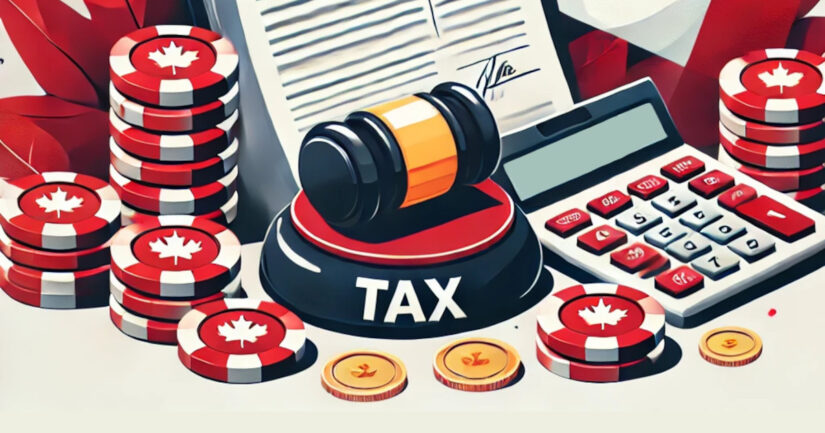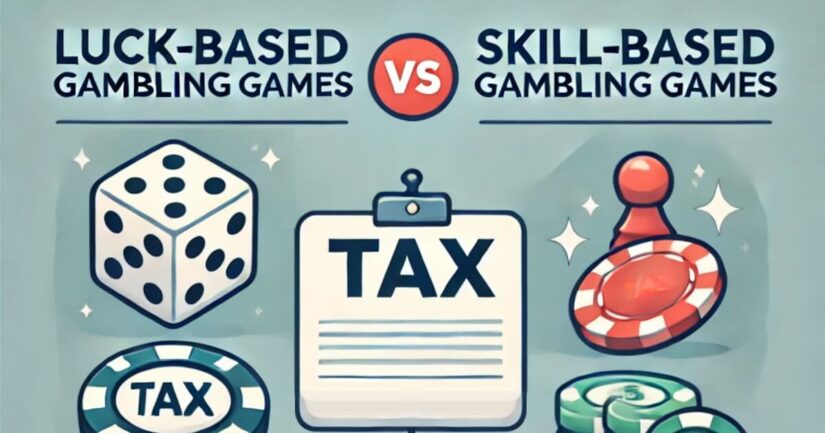How Gambling Tax Works in Canada

Engaging in gambling can be a thrilling experience, bringing enjoyment and, for some, financial gain. For the vast majority of Canadians, winnings from gambling activities aren't subject to taxation. However, some important exceptions do exist.
Your obligation to pay tax on gambling winnings varies based on several factors such as the gambling activities you engage in and the specific games you choose to play. While you may not owe taxes on your actual winnings, any interest generated from those winnings is taxable.
Given the various scenarios that can arise, we have put together this comprehensive guide aimed at clarifying whether or not taxes are applicable to your gambling profits.
Is it necessary to pay taxes on gambling wins in Canada?
Players classified as non-professional gamblers do not have to pay taxes on their gambling winnings in Canada , which applies to the overwhelming majority of individuals.
This tax regulation is uniform across all provinces and encompasses all types of gambling, including both land-based and online options. online casinos in Canada or betting in person.
To be considered a professional gambler, you need to consistently earn money from gambling, rather than simply experiencing occasional wins or having a net gain at a specific casino. We will elaborate on this point.
Windfall
For those who gamble as a hobby, winnings are regarded as non-taxable windfalls. This indicates that you entered into gambling not expecting to make a profit .
It's quite probable that you also experience losses and primarily gamble for entertainment or as a pastime, often with little to no skill involved. Most casual gamblers in Canada are in such a position, meaning they will not incur any tax obligations.
The government of Canada believes it's unjust to impose taxes on casual gamblers or individuals who play purely for enjoyment. However, taxes will apply to any interest earned from your gambling winnings; for instance, interest from investments or savings. Therefore, it's wise to maintain a record of your gambling activities just in case.
Profit-focused
On the other hand, professional gamblers treat their winnings as taxable business income because they are expected to win and generate long-term profits based on their experience, strategy, and consistent success .
Typically, professional gamblers rely solely on their gambling activities for income, making all of their winnings liable for taxation.
How type of gambling can affect tax

The nature of the games you play and the bets you place significantly influence your tax status regarding gambling. This includes whether your gambling is based solely on chance or involves an element of strategy and knowledge.
It's crucial to understand that playing skill-based games alone doesn't automatically categorize you as a professional. Additional criteria must also be met. Nevertheless, here’s how it could influence your situation.
Games of chance
Luck-based games are those where the player’s skill does not influence the outcome at all. This category includes games such as:
- Slots
- Lotteries
- Roulette
In luck-based games, the player cannot alter the final result. Instead, you simply place your bets and hope for a favorable outcome.
Skill-based games
In contrast, skill-based games allow your expertise and decision-making to impact the results. Classic poker exemplifies this, as success heavily hinges on players' choices. However, the category also extends to other games such as:
- Blackjack
- Sports betting
- Craps
These games, while requiring some skill, can also be classified as windfalls or income depending on individual circumstances. Determining the tax applicability can be complex, highlighting the need for meticulous record-keeping.
Are gambling losses tax deductible?
If you're an amateur gambler, you cannot claim gambling losses on your taxes —which is true for most individuals—since no tax is owed on your winnings.
Conversely, professional gamblers can indeed deduct their losses when filing taxes in Canada . Under the Income Tax Act, losses may be claimed, but the rules can be complicated, so seeking legal tax advice is advisable.
There are additional tax benefits available for professional gamblers. For instance, if you are hired to perform professionally based on your gambling abilities, you might qualify for tax deductions. If you work as an independent contractor, expenses for tournaments, travel, or accommodations may also be deductible.
How should you report taxable winnings?
To report your gambling winnings, utilize tax forms T3, T5, and T5013. If your interest earnings from gambling don't exceed $50, you won’t receive a T5 form. Regardless, it’s essential to report all winnings to avoid penalties. Ensure these earnings are included in your personal income tax.
All things considered, it’s crucial to keep a detailed record of any gambling winnings. Additionally, if in doubt, consulting with a tax professional can provide peace of mind. Safeguarding yourself against potential issues with tax obligations is always wise.
Gambling taxes per province
Although federal regulations govern gambling taxes in Canada, the specific tax you owe will vary by province. This rule holds for both professional and amateur gamblers concerning any interest earned from gambling winnings.
Here’s a brief overview by province:
- Ontario : 5.05% to 13.16% depending on the income
- Quebec : 14% of the initial $49,264 income
- British Columbia : Seven tax brackets starting at 5.06% and reaching a maximum of 20.50%.
- Alberta : 10% on the first $142,292,
- In places like Calgary, tax can be as high as 15% on income above $341,502.
- Manitoba : Offers three tax brackets ranging from 10.80% to 17.4%.
- Saskatchewan : Taxes commence at 10.5% on the first $49,720.
- Nova Scotia : Tax rates vary between 8.79% and 21%, depending on income levels.
- New Brunswick : Rates depend on income and range from 9.4% to 19.5%.
- Prince Edward Island : Features three tax brackets between 9.8% and 16.7%.
- Newfoundland and Labrador : Tax rates range from 8.7% to 21.8%, contingent on income.
Taxes on gambling abroad
While Canada boasts numerous land-based casinos, online gambling is also quite popular among Canadians. In Ontario , all online gambling platforms are thoroughly regulated, ensuring players engage only with licensed sites.
However, no province has yet established regulations for online gambling, which has resulted in numerous offshore online casinos welcoming Canadian players. For instance, MGA casinos casinos licensed in Malta have seen a surge in popularity among Canadian gamblers.
Tax treatment for winnings in offshore online casinos operates similarly—whether you are classified as an amateur or professional gambler.
Even though there may be no tax implications from the Canadian government, it is essential to be aware of any taxes that might arise in the jurisdiction where you are playing. These taxes are typically collected at the source, reinforcing the necessity of maintaining comprehensive records of all earnings and expenses.
US gambling
The taxation rules for gambling in the United States differ slightly. Winnings from US gambling are not subject to reporting and aren’t treated as taxable income in Canada . Many Canadians travel across the border to enjoy face-to-face gambling at these casinos.
It is important to note, however, that US casinos might impose local taxes on any winnings that you cash out .